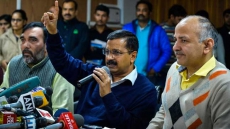Hundreds of Sikhs from Punjab on Wednesday joined the anti-citizenship law protestors at South East Delhi's Shaheen Bagh, demanding withdrawal of the contentious legislation.
The gathering of around 350 Sikhs from Moga, Barnala, Ludhiana, Patiala, Sangroor districts came as farmers' body Kisan Union (Ekta) (Ugraha) extended its support to the protestors here.
An indefinite protest at Shaheen Bagh had started on December 15 with people demanding that the government withdraw the Citizenship Amendment Act (CAA) and a possible pan-India National Register of Citizens (NRC). Similar indefinite protests had simultaneously unfolded at Jamia Millia Islamia and Zakir Nagar also.
"Now they (the government) will get envious seeing the solid unit of Sikhs with Muslims and Hindus here. And this is just one step outside our home, the full journey will be completed when the government repeals this law," Jagjeet Singh, who came from Moga, told PTI in a mix of Punjabi and Hindi.
"Guru Gobind Singh ji taught us thay we must oppose oppression wherever we see it and that is our motivation to join this fight," he added.
Asked how long would the Kisan Union members stay at the protest site, one of them said, "The decision will be taken by our elders. We can be here as long as required. CAA and NRC is just one issue. The government is answerable for many other issues including those of farmers."
Photos of protesters at Shaheen Bagh making ‘kadha prasad’ went viral as a Sikh delegation joined ongoing protests against the contentious Citizenship Amendment Act.
The photos were uploaded in Shaheen Bagh protests’ official handle on Twitter: “The women of Shaheen bagh helping in making 'Kadha Prasad' as a Sikh delegation joined the protest today at eight in the morning. Waheguru ji ka khalsa, waheguru ji ki Fateh”.
At 7.30 pm, an estimated five thousand protestors, including women and children, stayed put at Shaheen Bagh.
Zainul Abidin, 44, of Ghaffar Manzil had started an indefinite hunger strike on December 16 to press the demand for repealing the CAA -- and after a fortnight was joined by Mehrunissa, 40, of Sarita Vihar. Besides them, three elderly women -- now popular as the 'Dabang Dadis' of Shaheen Bagh -- too have been a constant sight at the centre stage of the protest venue since day one.
Shaheen Bagh local Nadeem, around 25, said though it has been a month and the government was yet to pay any heed but the support pouring in from various parts of the country and different faiths is helping the demonstration sustain.
"It's energising and fills us with hope... Like Sikhs and Hindus who are not even from Delhi coming here to support the cause," Nadeem, who runs a glass shop, said.
Another local, Mohammad Nafees, around 45, said the gathering continues at Shaheen Bagh round the clock and even working professionals also chipping in.
"One hour, two hours or full day, whatever people can do to keep this movement going they are doing it. The time otherwise spent in other leisurely pleasures is now being consumed here," Nafees, who has an air conditioner repairing shop, told.
Besides Delhi, protests have unfolded in several parts of the country over the contentious law since it was passed on December 11 and have led to clashes at several places including Uttar Pradesh, where nearly 20 people have died.
According to the amended law, members of Hindu, Sikh, Buddhist, Jain, Parsi and Christian communities who have come from Pakistan, Bangladesh and Afghanistan till December 31, 2014 and facing religious persecution there will not be treated as illegal immigrants but given Indian citizenship. The law excludes Muslims.
Those opposing the law contend that it discriminates on the basis of religion and violates the Constitution.
They also allege that the CAA along withe the NRC is intended to target the Muslim community in India. However, the central government has dismissed the allegations, maintaining that the law is intended to give citizenship to the persecuted people from the three neighbouring countries and not to take away citizenship from anyone.

